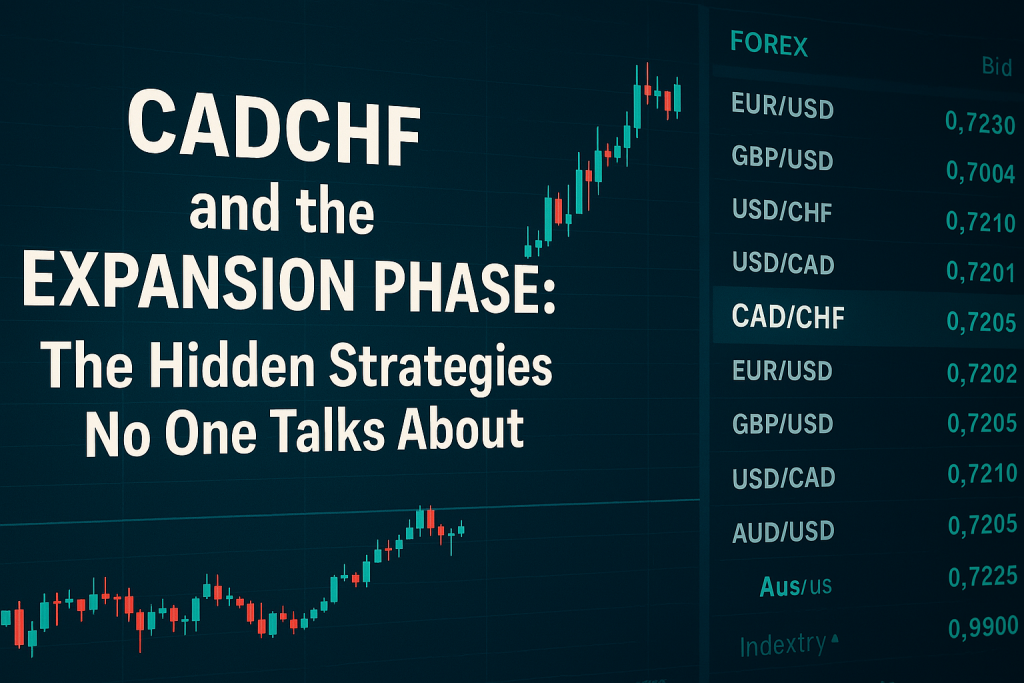The Swiss Army Knife of Market Moves: Cracking CAD/CHF During the Expansion Phase

Imagine trying to fit into jeans after a buffet. That uncomfortable, unstoppable stretch? That, my friend, is the expansion phase in the Forex market. And CAD/CHF? It’s the denim you didn’t realize was about to burst at the seams. This pair may seem quiet on the surface, but during expansion phases, it turns into the silent assassin of profits (or portfolio implosions, depending on your preparation).
Let’s rip off the polite wallpaper and get real: most traders sleep on CAD/CHF. But if you know where to look, and more importantly when to look, this pair is a masterclass in momentum, volatility, and macroeconomic symphony. In this underground tour, we’re dissecting the anatomy of CAD/CHF during its expansion phase—why it happens, how to catch it, and the ninja tactics elite traders use to turn it into a precision profit machine.
The Hidden Trigger: What Actually Sparks the Expansion?
Here’s the myth-buster moment: expansion phases don’t come from nowhere. They’re born from compression. It’s the classic coiled spring setup. But unlike pairs like EUR/USD, CAD/CHF loves to fake its mood like a soap opera villain—stoic until it explodes.
The real catalyst? Divergence between Canadian economic data and Swiss risk appetite. Canada’s oil-driven economy flirts with commodity shocks, while Switzerland acts like the financial monastery of Europe. When oil surges and Swiss investors start sweating over global risk, CAD/CHF lights up.
Watch for these triggers:
- Crude Oil rallies (+ correlation with CAD)
- SNB policy surprise (hint: when they say they “don’t intervene much,” they’re about to)
- Global risk-off sentiment paired with strong Canadian GDP, CPI, or employment numbers
Pro Tip: Use the Choppiness Index to identify when the pair is done consolidating and ready to stretch its legs. Anything below 38? Keep your eyes peeled—expansion is coming.
Why Most Traders Get Wrecked: Misreading the Swiss Silence
Ever ghost-texted someone only to realize they were in “Do Not Disturb” mode the whole time? That’s the Swiss Franc. It’s calm, collected, and often mistaken for disinterest.
But here’s the kicker: CHF’s silence isn’t apathy, it’s calculation. During expansion, Swiss institutions often respond to international chaos. If traders ignore geopolitical escalations, volatility indices, or even bond yield spreads, they miss the CHF’s reactive nature.
Avoid these classic mistakes:
- Using breakout strategies during low volatility phases (spoiler: it’s a trap)
- Ignoring Swiss National Bank’s vague-yet-deadly comments
- Overleveraging on early breakouts (CAD/CHF expansion often retests… brutally)
Counterintuitive Play: Layer in sentiment analysis from Swiss bond markets. When CHF bond yields drop while the VIX spikes, expect CHF strength to kick in hard.
Ninja Tactics: How Elite Traders Time the Expansion Phase Like Clockwork
Timing CAD/CHF expansions isn’t about staring at charts until your eyes fall out. It’s about precision.
Here’s the secret sauce, broken down into elite moves:
The Triple Confirmation Entry
- Compression range spotted via Bollinger Band squeeze (BB width < 0.0100)
- Oil price trend confirmation (WTI > 3-day EMA)
- COT Report showing commercial positioning favoring CAD or CHF
Volatility Traps with ATR Bands
- Wait for ATR breakout above 14-day average
- Enter after the second daily candle confirms higher volatility, not the first
Sentiment Stacking
- Combine CAD consumer confidence data with Swiss KOF Economic Barometer
- If CAD confidence rises while Swiss data disappoints, green light for CAD dominance
News-Anticipation Scalping
- Front-run SNB pressers by placing tight-range traps during the European session
- If no rate hike but hawkish tone = CHF surge; play the fade once US data drops
The Hidden Pattern Only Pros Spot: The Swiss Sawtooth
One underground price pattern that quietly dominates CAD/CHF in expansion mode? The Swiss Sawtooth.
What it looks like:
- Alternating higher highs and lower closes in 4H timeframes
- Mimics a false breakout pattern but leads to directional grind
How to trade it:
- Use trailing stops instead of hard exits
- Position size smaller, pyramid in gradually as direction confirms
- Exit on momentum divergence + reversal candle
Example: In Q3 2023, after a surprise SNB rate hold, CAD/CHF created 7 consecutive Swiss Sawtooth patterns over 2 weeks, generating a 210-pip run while retail traders kept trying to fade it.
Real-World Case Study: Expansion After the Oil Shock of 2022
In mid-2022, oil markets roared back post-COVID. Canada’s economic engine revved up, while global risk sentiment faltered due to war tensions in Europe.
Result? CAD/CHF exploded from 0.7150 to 0.7650 over 3 weeks.
But here’s what most missed:
- The Choppiness Index dipped below 32 four days before the move
- Swiss bond yields turned negative while CAD employment beat forecasts
- COT data showed commercial buying in CAD futures spiking 2 weeks prior
This wasn’t luck. It was the textbook expansion trigger cocktail.
Strategic Summary: Turning Knowledge into Ninja-Level Execution
Here’s your elite checklist for riding the CAD/CHF expansion phase like a pro:
- ✅ Use the Choppiness Index + Bollinger Band width to sniff out pre-expansion compression
- ✅ Cross-check with crude oil trends and VIX levels
- ✅ Track SNB press releases and COT data for early cues
- ✅ Be patient: Wait for the second candle post-breakout for confirmation
- ✅ Watch for the Swiss Sawtooth—and ride it like the silent rollercoaster it is
Want tools to do this without pulling your hair out? Check out our:
- Forex News Today for market-moving catalysts
- Free Forex Courses with little-known expansion strategies
- StarseedFX Smart Trading Tool to automate your entry precision and exit discipline
—————–
Image Credits: Cover image at the top is AI-generated
PLEASE NOTE: This is not trading advice. It is educational content. Markets are influenced by numerous factors, and their reactions can vary each time.

Anne Durrell & Mo
About the Author
Anne Durrell (aka Anne Abouzeid), a former teacher, has a unique talent for transforming complex Forex concepts into something easy, accessible, and even fun. With a blend of humor and in-depth market insight, Anne makes learning about Forex both enlightening and entertaining. She began her trading journey alongside her husband, Mohamed Abouzeid, and they have now been trading full-time for over 12 years.
Anne loves writing and sharing her expertise. For those new to trading, she provides a variety of free forex courses on StarseedFX. If you enjoy the content and want to support her work, consider joining The StarseedFX Community, where you will get daily market insights and trading alerts.
Share This Articles
Recent Articles
The GBP/NZD Magic Trick: How Genetic Algorithms Can Transform Your Forex Strategy
The British Pound-New Zealand Dollar: Genetic Algorithms and the Hidden Forces Shaping Currency Pairs
Chande Momentum Oscillator Hack for AUD/JPY
The Forgotten Momentum Trick That’s Quietly Dominating AUD/JPY Why Most Traders Miss the Signal
Bearish Market Hack HFT Firms Hope You’ll Never Learn
The One Bearish Market Hack High Frequency Traders Don't Want You to Know The

